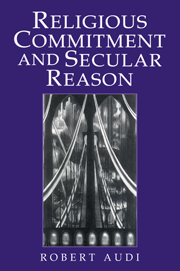Book contents
- Frontmatter
- Contents
- Preface
- PART ONE THE FOUNDATIONS OF DEMOCRACY AND THE SEPARATION OF CHURCH AND STATE
- 1 The Plurality of Paths to Liberal Democracy
- 2 The Separation of Church and State
- 3 Church-State Separation and the Justification of Governmental Power
- PART TWO THE ETHICS OF CITIZENSHIP AND THE BALANCE OF RELIGIOUS AND POLITICAL ARGUMENTS
- PART THREE CIVIC VIRTUE AND POLITICAL ACTIVISM IN A RELIGIOUSLY PLURALISTIC DEMOCRACY
- Conclusion: Ethics, Religion, and Democracy
- Notes
- Index
1 - The Plurality of Paths to Liberal Democracy
Published online by Cambridge University Press: 05 June 2012
- Frontmatter
- Contents
- Preface
- PART ONE THE FOUNDATIONS OF DEMOCRACY AND THE SEPARATION OF CHURCH AND STATE
- 1 The Plurality of Paths to Liberal Democracy
- 2 The Separation of Church and State
- 3 Church-State Separation and the Justification of Governmental Power
- PART TWO THE ETHICS OF CITIZENSHIP AND THE BALANCE OF RELIGIOUS AND POLITICAL ARGUMENTS
- PART THREE CIVIC VIRTUE AND POLITICAL ACTIVISM IN A RELIGIOUSLY PLURALISTIC DEMOCRACY
- Conclusion: Ethics, Religion, and Democracy
- Notes
- Index
Summary
Democratic government is entirely dependent on the people it represents. Factions can cripple it. Indifference can undermine it. Fanatical consensus can pervert it into a tyranny of the majority. It thrives on the political commitment and mutual respect of its citizens, on fair competition among individuals and institutions, and on diversity in ideas, culture, and individual personalities. The present age is witnessing serious challenges to the historically strongest democracies and a multitude of forces that retard the development of new ones. There is political apathy among the citizens in many nations; self-serving governments are widespread; and in many other countries there is religious and political fanaticism. In and outside democratic nations, there is corruption among many who wield political power. In many parts of the world, there are structural injustices, both economic and political. A democratic society that does not effectively combat these evils – apathy, fanaticism, corruption, injustice, and other threats to democracy – is at best unstable.
This book addresses a clearly central aspect of the current challenge to democracy: the delicate problem of how a free and democratic society can achieve an appropriate harmony between religion and politics. As a source of human flourishing and as a stimulus to citizenship, religion has played a unique and powerful role in the development of democracy. Many religious traditions not only insist on preservation of liberty but also require their followers to be conscientious, constructive citizens.
- Type
- Chapter
- Information
- Religious Commitment and Secular Reason , pp. 3 - 30Publisher: Cambridge University PressPrint publication year: 2000



